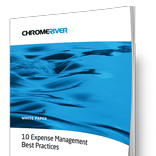If you went to last week’s GBTA Conference, you probably came back with a fresh perspective, having seen the latest and greatest trends and innovations in the business travel industry. With these still fresh in your mind, now is a good time to revisit how travel and expense policies are managed at your own organization.
Whether you are writing your organisation’s first travel and expense policy, or you are a corporate travel veteran who has had one in place for many years, it's always good to look outside your own immediate network and see what other world-class organisations are doing to effectively manage their employees’ spend. This enables you to refine and enhance your own expense management program and incorporate these best practices.
Industry best practices need to be tailored specifically to each organisation, and then implemented and enforced to be successful. In particular, manual processes need to be automated in order to reduce costs, improve accuracy, enhance consistency and increase operational efficiency.
Even though no two companies have the same policies, there are certain features that best-in-class policies often share. Here are six common elements implemented by leading organisations around the world:
1. Require pre-approval: Incorporate ‘pre-approvals’ before the expenses are incurred. “Cost avoidance savings” means finding ways to avoid costs before they are incurred. And employees are more likely to be careful with their spend, knowing that it is being reviewed.
2. Initiate a corporate card program: Today's corporate card programs are plentiful and highly competitive – they offer many financial and operational benefits such as rebates, elimination of cash advances and reduction of falsified receipts. Putting plastic in employees’ hands can really be a time-saver when it comes time to reconcile statements and expense charges.
Related: 5 Benefits of Corporate Card Programs
3. Automate policy enforcement: Be preventative instead of protective. Compliance rules can be built into expense management tools and are validated in real-time while a user enters new expenses. Your employees are reminded of the rules for per diems, for hotel budgets, etc. just by entering their expenses.
4. Clearly document the approval process: Make the process well defined for the expense owner and the approver for limits, allocations, approval delegation and other process standards. This way your employees can rest assured that their expenses are sitting in their manager’s inbox while interest accrues on a personal charge card.
5. Help employees make good decisions: Use automation to assist with absolutely accurate data entry direct from credit card charges. Implement powerful business rules to capture unique approval situations.
Related: How could your organisation be exposed to expense fraud?
6. Centralise the travel expense process: By implementing an automated expense management platform, a consistent, programmatic approach replaces a substantial amount of human intervention – reduces costs and increases operational efficiency. Implementing powerful business rules makes it easier to capture unique approval situations and leverage unique industry partnerships.
Leveraging technology can also streamline the expense process significantly, so Uber and hotel folio charges are automatically transferred to draft expense claims. Likewise, enabling trip itineraries and expenses from Sabre to be imported into an expense claim on any device can also speed up the process.
If you’d like to learn more about corporate expense best practices, download our white paper, 10 Essential Expense Best Practices.
Search
Subscribe
Latest Posts
- UK Finance Leaders Reveal Biggest Concerns for the Post-COVID Recovery
- 9 Signs it’s Time to Switch Expense Management Systems
- Gartner and Ardent Partners Advise How to Build a Best-in-class Accounts Payable Operation
- When Cash (Control) is King: Is Your Accounts Payable Strategy Optimised for a COVID-19 World?
- Getting the Most Out of Your Spend Data with Emburse Insight Advisor
Posts by Category
Our choice of Chrome River EXPENSE was made in part due to the very user-friendly interface, easy configurability, and the clear commitment to impactful customer service – all aspects in which Chrome River was the clear winner. While Chrome River is not as large as some of the other vendors we considered, we found that to be a benefit and our due diligence showed that it could support us as well as any large players in the space, along with a personalized level of customer care.
We are excited to be able to enforce much more stringent compliance to our expense guidelines and significantly enhance our expense reporting and analytics. By automating these processes, we will be able to free up AP time formerly spent on manual administrative tasks, and enhance the role by being much more strategic.
